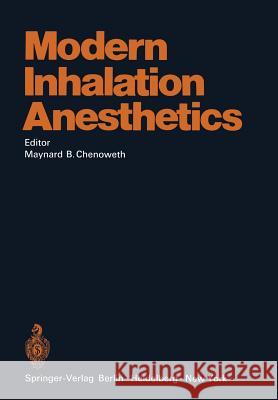Modern Inhalation Anesthetics » książka
Modern Inhalation Anesthetics
ISBN-13: 9783642650574 / Angielski / Miękka / 2012 / 592 str.
The most important development in studies of the metabolic effects of anes- thetics has been the recent demonstration that anesthetics may alter the rate of transport of metabolites across biologic membranes. The membranes affected include cell membranes as well as mitochondrial membranes. Inhalation anesthe- tics generally have little effect on glycolysis but may sigrllficantly alter oxidative phosphorylation and mitochondrial oxygen consumption. The direct effects of anesthetics on cell metabolism may be overshadowed in vitro by secondary effects anesthetics exert on endocrine balance, organ blood flow, and changes in oxygen and carbon dioxide tensions. References ALBERS, C., BRENDEL, W., USINGER, W.: Kreislaufrespiratorischer Stoffwechsel undAtmung in Athernarkose. Arch. expo Pathol. Pharmakol., Naunyn-Schmiedeberg's 226, 278 (1955). ALEXANDER, S. C., COHEN, P. J., WOLLMAN, H., SMITH, T. C., REIVICH, ~L, MOLEN, R. A. U.: Cerebral carbohydrate metabolism during hypocarbia in man. Studies during nitrous oxide anesthesia. Anesthesiology 26, 624 (1965). ANDERSEN, N. B.: Effect of general anesthetics on sodium transport in the isolated toad bladder. Anesthesiology 27, 304 (1966). - Synergistic effect of cyclopropane and epinephrine on sodium transport in toad bladder. Anesthesiology 28, 438 (1967). ANNAMUNTHODO, H., KEATING, V., PATRICK, S. J.: Liver glycogen alteration in anaesthesia and surgery. Anaesthesia 13, 429 (1958). APRAHAMIAN, H. A., VANDERVEEN, J. L., BUNKER, J. P., MURPHY, A. J., CRAWFORD, J. D.: The influence of general anesthetics on water and solute excretion in man. Ann. Surg. 100, 122 (1959).











